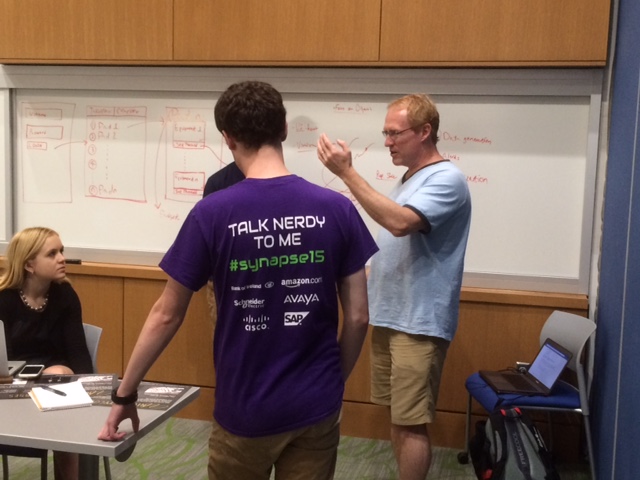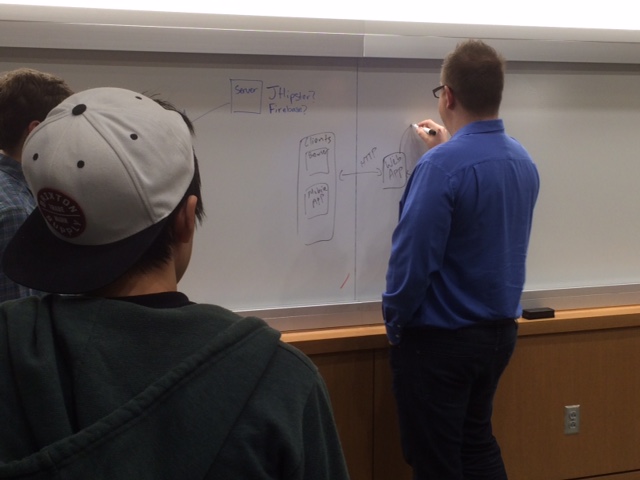Home » Mobile Cloud Computing » One-on-one with the faculty behind Tackling Big Questions with Mobile Cloud Computing (Part 3 of 3)
One-on-one with the faculty behind Tackling Big Questions with Mobile Cloud Computing (Part 3 of 3)
Posted by anderc8 on Thursday, January 26, 2017 in Mobile Cloud Computing, News.
Vanderbilt University Computer Science professors Douglas C. Schmidt and Jules White recently sat down to answer a few questions about their University Course, Tackling Big Questions with Mobile Cloud Computing, which they co-taught during the Fall 2016 semester and are co-teaching again this spring. In the third and final installment of a three-part series, Profs. Schmidt and White discuss what they hope their students can accomplish during the Spring 2017 semester – the bar is set high!
To read the first installment of this three-part blog, click HERE.
To read the second installment of this three-part blog, click HERE.

Vanderbilt Professor Doug Schmidt (right) works with one of the project teams during the Fall 2016 semester
What are you hoping we are talking about following the Spring 2017 semester?
Jules: We hope to see some of these projects have matured to the point where they make it all the way through and launch, for example, where they’ve enrolled—and ideally graduated from—the Wond’ry’s Preflight program. It will be such an invaluable experience for students to create an app from scratch, get it released through Apple’s AppStore and/or Google’s PlayStore with people actually using it to solve real problems, and experience the complete lifecycle from ideation to productization, which is one of the hardest things to work with and learn from by “book learning” alone. So far, it looks like our Malnutrition and Legal Aid apps will going this route, as well as whichever other teams are successful this semester, which is really exciting. By the end of the Spring 2017 semester we’ll also hopefully know the potential for spinoffs, as well as how can we address thorny intellectual property issues and concretely demonstrate the payoff of Vanderbilt’s investment in multi-disciplinary research, teaching, and entrepreneurship.

Vanderbilt Assistant Professor Jules White works at the whiteboard with one of the project teams during the Fall 2016 semester
Doug: At the end of every spring semester we also have an Engineering Fair where our students show off the results of their capstone design courses and our software engineering project courses. Many employers and alums come to this fair each year to see all the cool stuff that we’re doing in the Engineering School. This spring will be the first time we’ll be able to showcase the results of the apps created by the multi-disciplinary students in our University Course. Up to this point, the bulk of these projects were just Engineering-centric. This is the first year, however, where the Engineering Fair can also include university students from other disciplines participating. I think that’s going to give the prospective employers even more interest because they’re looking to hire students who are well-rounded and have a track-record working successful in diverse, multi-disciplinary teams.
Jules: We’re also hoping, of course, that at least a few of the next round of University Courses starting in the Fall of 2017 will continue to broaden our outreach to university students beyond the traditional Computer Science discipline. There seems to be a lot of pent-up demand on campus for access to CS courses, and we can’t fit all the students into our one course. If there are more courses then hopefully we can meet the demand and get more faculty, staff, and students involved to tackle other big societal problems!
Talk about how your relationship with individuals from VUMC has helped with your University Course
Doug: The researchers from VUMC we’re working on our TIPs project have many great ideas for tackling big problems in healthcare. Although these are things we would like never have thought of solely from our CS perspective, we’re well positioned to help them devise solutions by applying our cutting-edge expertise in mobile cloud computing. We’ve worked together in the TIPs program, the University Course, and in conjunction with the Wond’ry to select the most promising ideas, prototype them in conjunction with our students, test them in appropriate clinical settings, and then write proposals based on the results. It’s an iterative process where every semester we’ll have a new set of ideas and we’ll have built a pipeline of faculty, staff, and students whose can work with us to further refine these ideas, produce results, and then work with the Wond’ry to spin off the best apps and productize them.
